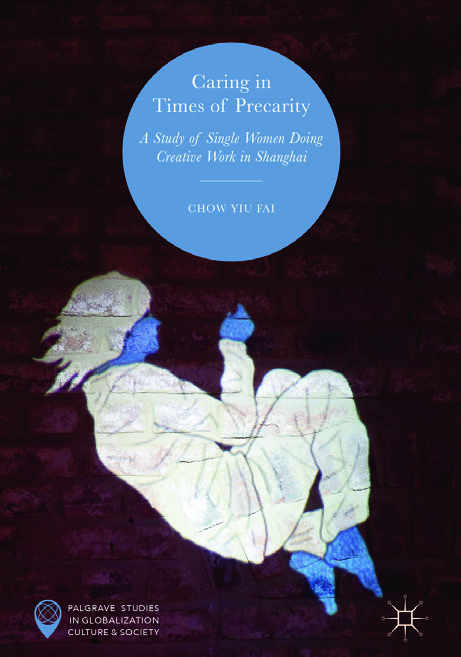Caring in times of precarity
Chow Yiu Fai. 2019.
Caring in Times of Precarity: A Study of Single Women doing Creative Work in Shanghai
New York: Palgrave Macmillan
ISBN 9783319768977
Is ‘being single’ or ‘going solo’ (Kinneret Lahad, A Table for One: A Critical Reading of Singlehood, Gender and Time, Manchester University Press, 2017) still a taboo to be subsumed under singlism? One would be surprised given that in everyday worlds across the globe, the ‘type’ of the single – be it man or woman – has become a fairly common sight and narrative in the past two decades or so. And yet, surprisingly, there is yet not much research published about what could be considered as one of the most interesting phenomena of global urbanization and social transformation, and even less so in the context of the so-called Global South, and with respect to women. If there is, then much attention is paid to how this ‘abnormal’ lifestyle can be overcome, still pathologizing the single woman as ‘left-over’ or ‘off the shelf’, ‘too demanding’ and ‘selfish’, to be normalized into marriage or at least a heteronormative relationship. But like Georg Simmel’s figure of the stranger, or Benjamin’s Flaneur, the single (woman) is a fascinating – and urban – phenomenon that emerges almost hundred years later, and allows us to think about neoliberal politics of creative (self-)employment, poetics of pleasure and the possibilities of unfolding a life of one’s own – despite all challenges – in urban habitats. Being single gestures towards concepts of respectability, autonomy and precarity at a particular moment and place in time.

How does a single lifestyle correspond with the highly demanding conditions of creative work in globalizing urban environs? And how does the single woman fit into an Asian realm, particularly under a paradoxical presence of Maoist notions of femininity, Confucian values and globalized and consumer-based repertoires of neo-liberal qualities of womanhood. With his book on single women in the creative industries of Shanghai, Chow Yiu Fai enriches and expands the slender field of ‘single studies’ and challenges views of precarity that often dominate the debate by proposing an ethics of care. The Associate Professor at the Department of Humanities and Creative Writing of Hong Kong Baptist University considers the perspective of journalists, musicians, artists, designers, and others. Altogether 25 interlocutors from various age, social and economic backgrounds were interviewed in Shanghai between 2015-17. Chow asks as well as ethnographically delineates how they experience precarity as stigmatization, stress and anxiety, but also nurture liberty, independence and choice. Care is defined as large as self-care (not to be identified with selfishness), for one’s well-being, agency and aspirations towards success and recognition, be it among working class or upper middle class. The author considers intergenerational relations of single women, how single women in the media reflect their media-based representation – between glamourization and stigmatization, inequality and empowerment. He also considers the role of the city as a laboratory and catalyst but also a highly competitive and lonely space. The eight chapters and epilogue of Caring in Times of Precarity are a fascinating read even for non-China specialists. Chow takes the reader to the various empirical grounds he has defined in the individual chapters. The sensibility for small details, for vernacular utterances, and the ability to relate this to larger questions, marks the book as engaged and engaging. But the book is also a remarkable read for its critical recalibration of certain Western-based theories on womanhood, feminism and precarity that – as a consequence – does not fall into the trap of Asianisms and rejection of theories from the ‘West’ (e.g., Foucault, Mouffe). This book is certainly a good choice for scholars and students in critical area studies, Asia/Chinese Studies, Gender and Urban Studies, as well as Transcultural and Globalisation Studies.
Christiane Brosius, Heidelberg Centre for Transcultural Studies, Germany